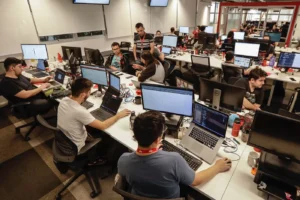Data from the Food and Agriculture Organization of the United Nations (FAO) realize that, in 30 years, the world will need to increase food production by up to 70%. It is in this context that knowing how to apply technology and inovation in the food sector it can be the biggest differentiator for future generations.
As food is one of the basic needs of human beings, this sector works through a large chain. And you will find out, below, how foodtechs contribute to revolutionizing the world of food.
What is foodtech?
Foodtechs emerged to innovate the food sector and food culture. The term is the combination of the English words “food” and “tech”, an abbreviation for “technology”.
The term comes in the wake of the creation of other definitions, such as construtech, fintech, healthtech… among others, and concerns the use of technology applied to the food sector. A foodtech is concerned with the problems in the area and seeks, by identifying the sector's pain points, to solve them through innovation and disruption and, of course, technology.
The expression refers to companies that work to innovate the world of food, whatever the segment. These companies can turn to big data, IoT (Internet of Things), Artificial intelligence, and many other technological innovations.
Among the problems that a foodtech seeks to solve, we can mention:
- Reduction of food waste;
- Facilitate contact between suppliers and consumers;
- Optimize delivery services;
- Improve the logistics of the entire food chain;
- Reduce the environmental impact of food production;
In other words, foodtech is not just about new delivery apps, but about an ecosystem of production, distribution and accessibility across the entire world of food.
The foodtech market in Brazil
Everything indicates that the foodtech market will grow in Brazil in the coming years, with record investment. The reasons for this growth range from the population's demand for more efficiency in the sector to the evolution of digital commerce.
Here, the survey of Startup Scanner points out that Brazil already has 470 foodtechs distributed in 112 cities. Most of them are still unknown to the general public and others, such as iFood, which is already a leader in Latin America.
Brazil needs the solutions that foodtech can bring, after all 19.1 million Brazilians are food insecure, according to Rede Penssan, and Brazil wastes around 60 kilos per person, annually, according to Food Waste Index 2021.
We highlight again FAO study which assesses the need to increase food production by approximately 70% by the year 2050. With demographic growth and scarcity of resources, this would be the necessary bill to meet the needs of the population at this future time.
However, speaking of current times, foodtech also solves current demands, in a sector that needs faster, more efficient and humanized service.
In times of crisis, combining all these factors with tasty, safe and sustainable food is a challenge for foodtechs here and around the world.
Impact of foodtechs on the food sector
And foodtechs are not just looking at the future, but at the present of food, so it is important to highlight the benefits that these technology companies are already bringing in the short term.
One Emergen Research study, which analyzes emerging industries, brings significant numbers about the current situation of foodtechs. Firstly, the footech market is already estimated at US$$ 220 billion, driven by the growth of advanced technologies in the food industry.
Furthermore, the study also points out that the foodtech market presented, in 2018, a growth rate of 5.76% per year.
Regarding competitiveness, it was also noted how the market is fragmented, with several different players representing a significant portion of a specific demand in the food industry.
In this way, consumers benefit every day as they have easier access to a greater variety of foods that meet their specific needs.
One example is the growth of the vegetarian population in the country: a search commissioned by the Brazilian Vegetarian Society (SVB) to Ibope in 2018, points out that up until that moment 14% of Brazilians declared themselves as vegetarians.
In relation to food intolerances, statistics organized by the Brazilian Association of Allergy and Immunology (ASBAI) in 2019 show that 8% of children and 2% of adults suffer some type of food allergy in Brazil.
In other words, it is a new demand that grows every year. And it is also to better serve each food specificity that the use of technology in the food sector offers many advantages. Whether to facilitate access to products, improve cost-benefit or simply bring more flavor to the target audience, foodtech aims to optimize the entire chain.
foodtech trends
In a live broadcast promoted by Abrasel (Brazilian Association of Bars and Restaurants), Fabrício Bloisi, president of iFood, highlighted Tendencies to the market.
Regarding the food sector, Bloisi points to a striking change in the coming years, projecting an increase in delivery and healthy eating. This should generate a change in behavior and save time.
People would cook less as an obligation and spend fewer hours cleaning and maintaining the environments in which they dine. Here in the iFood blog, we have already highlighted all the advantages that foodtech can bring to the sector and we will highlight some of them:
-
Increased employability: foodtech allows small entrepreneurs who are starting their businesses to have help with operational issues, being able to focus more on subjects such as marketing and finance.
- Higher quality of meals: The system of assessments of foodtech makes the ruler rise. Companies care more about offering superior quality food and meals, as they know that the feedback will be public.
- Variety with practicality: vegetarian dishes? foods from all over the world? One day of saving and another of spending? All options are possible when you have a wide range of possibilities and all without leaving home.
iFood as a foodtech reference in Latin America
iFood is present throughout Brazil and is also present in Colombia. Today, it is the largest foodtech in Latin America and has been advancing its initiatives towards innovation and sustainability in the food sector.
iFood seeks to generate positive impacts on society, for example, with the program Everyone at the Table. In this initiative, iFood makes connections between the private sector and social organizations to combat food waste and food insecurity.
Furthermore, iFood is the first foodtech in Brazil to sign the UN Global Compact, the largest corporate sustainability initiative in the world. With this, we want to reaffirm our commitment to solving major social challenges and being a foodtech reference on the continent.
Urban gardens: iFood begins food diversification projects. Click to see this and other actions.


